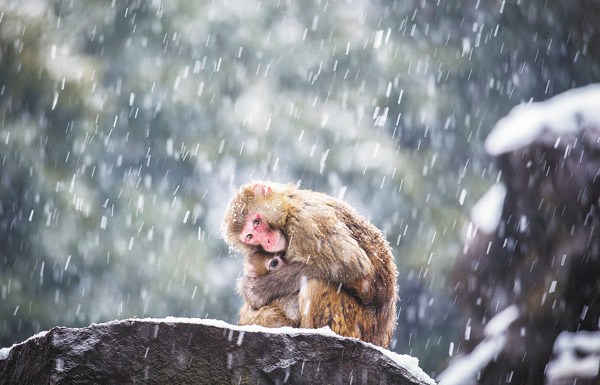
A baby monkey snuggles in its mother's arms for warmth in Hangzhou Zoo. XU KANGPING / FOR CHINA DAILY
Amid contradictory views on the lunar year's zodiac animal, one monkey stands so tall — it can change its size at will — that it threatens to dwarf not only its brethren but humans as well
Of all 12 zodiac animals, the monkey, while not enjoying the exalted status of the dragon or the tiger, is widely acknowledged to be closest to us humans. Comparing somebody to a monkey, though still largely derogatory, becomes more acceptable because it can take on a scientific dimension once Darwin's theory is factored in.
Most Chinese first encounter the human's relative in the zoo. In recent years some wildlife parks have offered a closer view of the animal's natural habitat. There have been reports of monkeys that pickpocketed tourists or committed other misdemeanors.
The practice of keeping a monkey as a pet is still rare, and the ancient Chinese tale of the monkey's loyalty, strikingly similar to the most moving accounts of dogs, is lost to all except a few historians.
Fortunately, 2016's zodiac animal has a strong presence in the country's language, arts and literature. Arguably China's most colorful literary creation is a personified monkey.
The Monkey King, from the epic Ming Dynasty (1368-1644) novel Journey to the West by Wu Cheng'en (1501-1582), has gained more worldwide renown than any other Chinese character of the literary canon. But monkeys do not have to possess superheroic qualities such as flying or changing the size of the weapon at whim. They include many idiosyncrasies that may not be in agreement.
The monkey is endowed with many conflicting traits. On the one hand it stands for impatience, as in the Chinese phrase that translates as monkey anxious. On the other hand, its word origin in Chinese points to a cleverness that induces a refusal to jump into precarious situations. In ancient times when hunters used food as bait, monkeys would climb to the top of trees and survey the environment for possible danger. They would bide their time until the danger — the presence of the hunters in this case — is gone before they targeted the food.
Monkey, hou in Chinese, has several paronyms that, contrary to conventional wisdom, are related at the root. One is denghou, meaning awaiting, the uncharacteristic tendency to resist instant gratification. The other seems more far-fetched: ancient vassals had to maneuver among shifting forces to maintain their power base. They developed sly adaptability and quick-headedness, or they would lose their domains or even their heads. They were called zhuhou, a word said to be derived from the word for primate.
The English expression monkey business contains some of the above implications, such as trickery and deceit, but mostly it refers to pranks and relatively harmless mischief, which is what comes to mind when association with the animal is queried.
Agility and mischievousness are perhaps the first impressions people the world over have of the monkey, regardless of culture. For good or for bad, monkeys display a strong tendency to throw not only monkey wrenches but all kinds of other things into the works.
The English language has the expressions grease monkey and powder monkey, among others, but Chinese have what can be translated as thin monkey, which started as an unflattering moniker for a man with low body fat. I don't know whether the word used as slang for Chinese Americans in early 20th century America was derived from that physicality. During times of food scarcity, a thin monkey was certainly not an object of envy. But the pendulum has swung the other way and we are living in an era when thin is much better than fat and fashion models look like the product of famine. So, now we have personal ads in Chinese in which the advertiser proudly touts himself as a "monkey", especially in the gay community.
On the smart monkey, Chinese and English see eye to eye. Although monkeys are known to be good imitators of human movements, the connotation of mimicry has not seeped into the Chinese lexicon. In Chinese that attribute is ascribed to the parrot, leaving the monkey and the ape out of the equation. But circus or zoo monkeys are frequently applauded for imitating human gestures.
It is perhaps a cruel twist that monkeys are also ridiculed for being foolish. The ancient Chinese saying "morning three and night four" is distilled from a tale of a pet owner scrambling to feed a bunch of macaques. "How about I feed you three chestnuts in the morning and four at night?" he asked. His pets were offended. So he said: "OK, OK, I'll give you four in the morning and three at night." And the monkeys were contented. What started as an allegory of deceit has now evolved into one of capriciousness.
Other pejorative phrases involving this year's zodiac animal include "monkeys reign in a mountain without a tiger", meaning monkeys are not born leaders, but are fit only to play second fiddle. If not for Sun Wukong, who crowned himself the Beautiful Monkey King, the primate may never have been known for self-confidence or even a tinge of braggadocio.
Human ambivalence toward the monkey lies at the root of all the contrasting qualities attributed to it. We deem it as below us, yet we project to it some of the traits that we love but we hate to admit — from an impish wit to a rebellious spirit. It does not ennoble us, but it surely makes us confront our inner self — and makes us proud of it.
The author is Raymond Zhou


















































